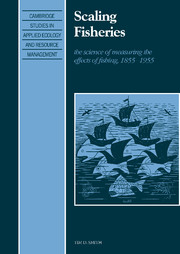Book contents
- Front Matter
- Contents
- Acknowledgements
- Preface to the Paperback Edition
- References
- Units used in the text
- Part I INTRODUCTION
- Part II DEVELOPING METHODS, 1855–1940
- Part III THREE PARTIAL THEORIES, 1940–1955
- 7 Middling in size
- 8 How many parents are enough?
- 9 Steady state yield
- 10 Integration: self-regenerating populations and the bionomic ecosystem
- Notes
- References
- Index of people
- Subject index
- Front Matter
- Contents
- Acknowledgements
- Preface to the Paperback Edition
- References
- Units used in the text
- Part I INTRODUCTION
- Part II DEVELOPING METHODS, 1855–1940
- Part III THREE PARTIAL THEORIES, 1940–1955
- 7 Middling in size
- 8 How many parents are enough?
- 9 Steady state yield
- 10 Integration: self-regenerating populations and the bionomic ecosystem
- Notes
- References
- Index of people
- Subject index
Summary
[T]he lesson is obvious. A population has its maximum increase when it is neither at maximum, nor minimum, size, but when middling in size; and that is the level at which the most individuals can be regularly removed and still be fully replenished by the population's inherent tendency to grow.
Oscar Sette 1943Despite the French claims of semantic priority discussed in chapter 1, the word ‘sardine’ has come to be used for the canned form of many small fish. Ignoring the French legal challenges of 1912, the Norwegian canners continued to market their small herring and sprats as ‘Sardines de Norvège.’ When a small California fishery began to develop after the First World War, based on a different species in the clupeoid family, Sardinops caerulea, the canned product was also marketed as ‘sardines.’ The quality was much better than the canned sprats of Norway, and the canned sea herring of the eastern US. Indeed, the US Fish Commission noted in 1901, in anticipation of what was to come (Smith 1901 p. 24):
With regard to the sardines of the Pacific coast of the United States, there is no reason why they should not prove equal to the French fish in every respect. The high reputation which has been acquired by the comparatively small quantities packed in California during the past five or six years, and the excellent prices which they have commanded, argue well for the success of an extensive business.
Information
- Type
- Chapter
- Information
- Scaling FisheriesThe Science of Measuring the Effects of Fishing, 1855–1955, pp. 239 - 266Publisher: Cambridge University PressPrint publication year: 1994
